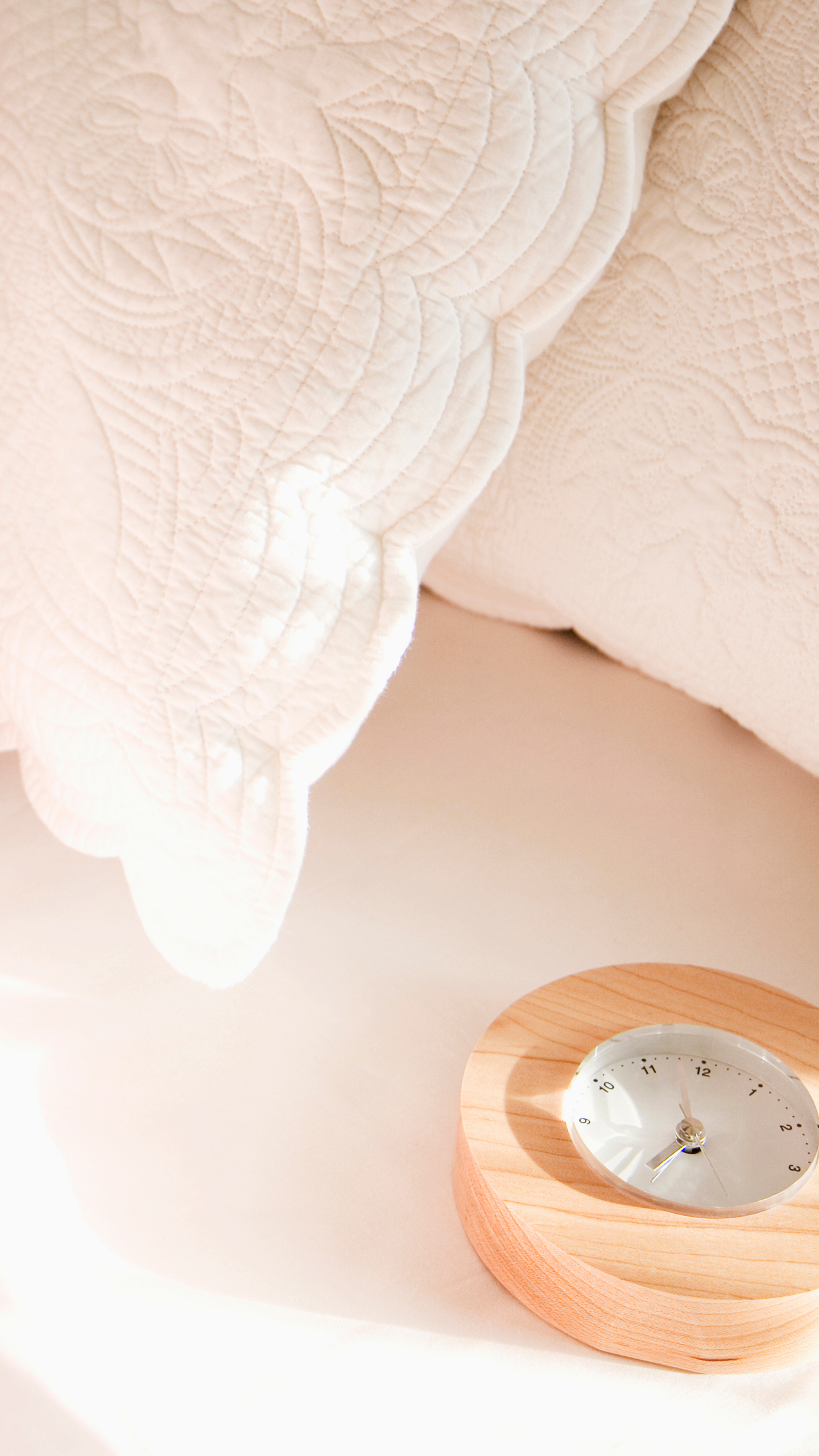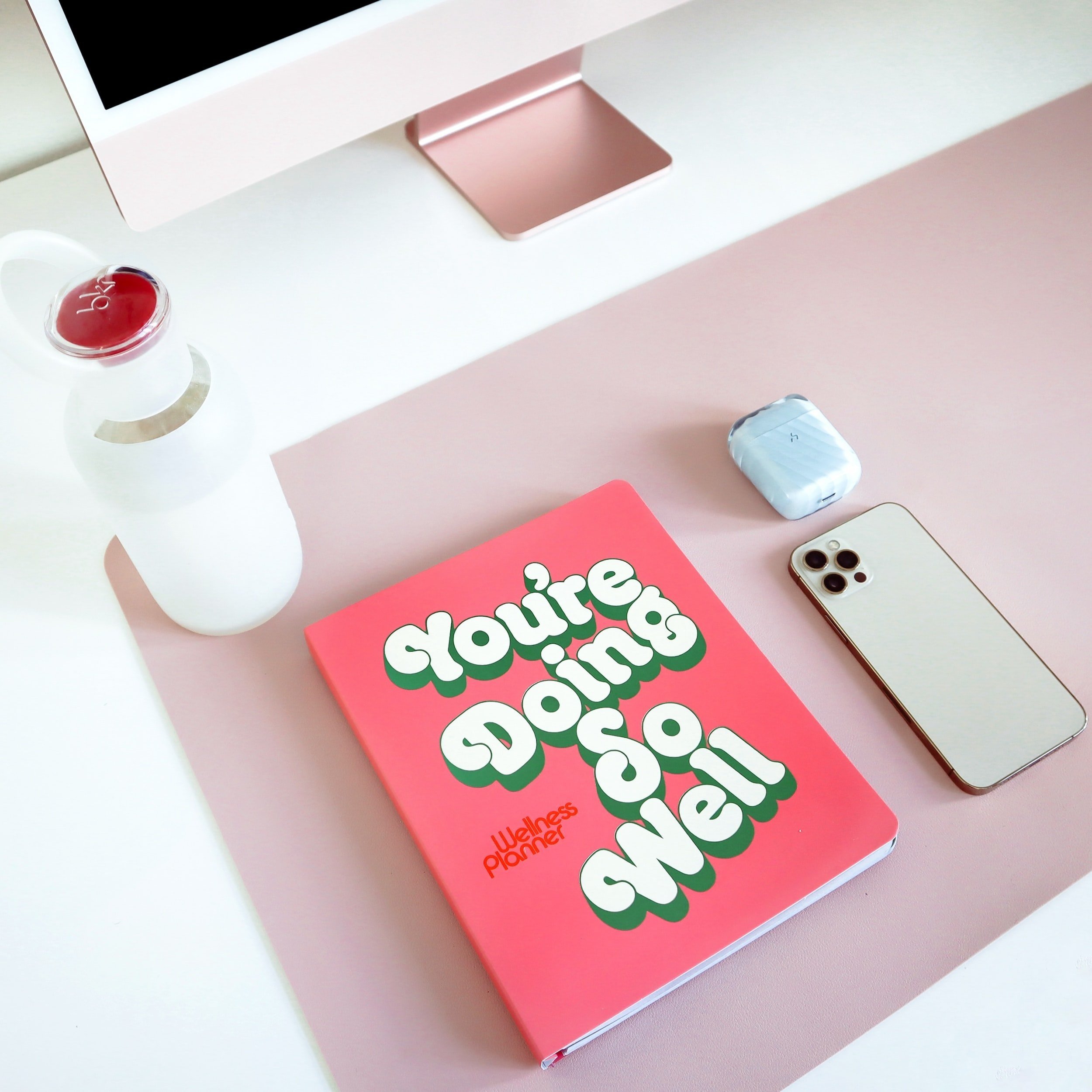The Morning Routine That Sets Me Up For A Productive Day
W&S Home and Living Editor
SHARE ON:
Struggling to use your time efficiently is a common problem among Gen Z and millennials. Getting distracted by our phones, feeling like we never have enough time to get things done, and generally wanting to be more productive is nothing new. But how do we combat this? What tools can we use to increase our likelihood of having a productive day? What does it even mean to have a productive day?
In this post, I try my best to answer these questions based on both evidence and my own experience on how I’ve come to manage simultaneously being a doctoral student and business owner at the age of 25. Stay to the end for some digital FREEBIES guaranteed to help you organize your life!
What Does It Mean To Have A Productive Day?
A productive day is when you complete your daily tasks most efficiently. This means you’ve completed your highest priority tasks to the best of your ability. You’ve used your time wisely and feel good about what you’ve been able to get done.
Productive days look different for different people, as we all have our unique lifestyles and associated goals to complete throughout the day. A productive day for you and your best friend is unlikely to look the same, but you both will get the same feeling when you reflect on what you did and how you accomplished it: accomplished.
Therefore, the first step in trying to have a productive day is defining what a productive day means to you. What things do you want to accomplish every day? Why? What things are you doing now in your daily routine that you want to stop? Why?
Answering these questions is essential to having a productive day because they help you conceptualize what productivity looks like for you by honing in on what’s crucial and not crucial for your definition of success.
With that said, it’s important to point out that the tips below aren’t intended to discourage you from defining what a productive day means to you. Instead, it’s aimed to be an inspirational springboard for you to start thinking about your personal views on productivity and provide some helpful tips that might help you get there!
Tips For A Productive Day
Like I said previously, productivity looks different for everybody. However, studies show that there may be some common grounds on which productivity is typically born. Here are a few of them:
Try waking up and going to sleep at the same time every day
Regulating your sleep schedule is one of the best tools to help optimize your time. This is because sleep is one of the most critical functions of maintaining a productive mindset. Studies show that getting quality sleep for at least 7-9 hours and heading to bed and waking up at the same time every night has a wonderful effect on your health and, thus, your ability to be productive.
For starters, more quality sleep and a regular sleep routine reduces your risk for cardiovascular disease, regulate hormonal cycles, boost your immune system, and aid in maintaining a healthy weight. Each of these benefits results from balancing your body’s internal alarm clock, known as your circadian rhythm.
Your circadian rhythm is vital as it helps determine your body’s energy levels throughout the day. This makes your circadian rhythm and sleep schedule crucial for your overall health and ability to be productive.
Whether waking up at 9 am every day or noon, ensure you’re getting enough regulated sleep if you want to reach your maximum productivity potential.
No caffeine at least an hour after waking up and 6 hours before bedtime.
Many of us are familiar with this one, but it’s vital to discuss it regardless. This is because caffeine can be a great source of productive energy when used correctly but can have diminishing returns when it isn’t.
In small, targeted doses, caffeine has been shown to tremendously impact a person’s alertness, concentration, and focus. Hence, this is why caffeine, whether in coffee, tea, or matcha, is a regular part of most people’s start to the day.
However, it shouldn’t be used with reckless abandon when your goal is to reach your maximum productivity potential. Caffeine is an “adenosine inhibitor”, meaning it reduces the effectiveness of adenosine (i.e. a hormone that signals your body to become drowsy) and therefore tends to wreak havoc on your ability to sleep.
Thus, it’s suggested that you abstain from caffeine at least 6 hours before you plan to head to bed. However, this timing might need to be adjusted depending on a person’s caffeine tolerance, age, body size, etc. Another thing to consider is how much caffeine you’re getting at a time.
Caffeine-sensitive individuals might find it more appropriate to avoid coffee and instead opt for matcha which releases caffeine slower, or teas with smaller amounts of caffeine altogether.
Make a realistic weekly schedule.
At this stage in my life and career, I live by the words, “If it’s not in my calendar, it’s not happening”. Planning is key when trying to get the most out of your time. Many people think productivity means you’re always busy, doing something, or never have time to rest and relax, when it’s not that at all!
In fact, I’d argue that productivity is for lazy people who want to put up the least amount of effort for the maximum result. Often, the ability to make realistic, effective timetables and stick to them is what separates productive people from less productive people.
But how does one start making a realistic timetable? First, it would be a good idea to think about what you can actually do. As I mentioned in our “Choosing Conscious Nutrition and Wellness” piece, habit-forming is a lengthy process.
Therefore, it’s best not to try and overshoot what you want to accomplish if you’re looking to make lasting changes to your time management. Start slowly with adding new habits, and be honest with yourself about where you’re at and what it’s going to take to get where you’re going.
Try adding new habits into your weekly timetable one at a time. Once you’re consistent with this new habit, then try to incorporate a new one and continue with this pattern until you’ve created your ideal weekly routine.
Do your more demanding tasks for the day BEFORE lunchtime.
“Eating the frog” is one of the most effective ways to get more done. It’s an analogy representing the psychology of avoiding procrastination. To “eat the frog” means to complete the most daunting, unsexy tasks you have for the day before doing anything else. By identifying your least desirable task (the frog) and completing it first (eating it), you set yourself up for a productive day.
Eating the frog makes you feel accomplished at the start of your day, meaning no matter what happens after, you will feel good about yourself and your work when reflecting. This increases your intrinsic motivation for other tasks you want to complete throughout the day, as they will all require less effort and energy to complete.
This strategy also takes advantage of your aforementioned circadian rhythms as people tend to be the most energized and naturally focused toward the start of their days. Thus, eating the frog is a method that allows you to use your natural energy cycles most effectively.
Keep your phone on “Airplane Mode” during your morning rituals.
Countless studies have shown that the content on our phones is a huge source of anxiety, stress, and co-dependence. Millennials and Gen Z are especially vulnerable to these impacts, yet are at a point where they can’t imagine a life without regularly using their phones or constantly having their phones on them.
The solution isn’t to be anti-phone, at least not in my opinion, because it’s unrealistic for most people today. Instead, I think we need to focus on putting tools in place where we can have healthier, more proactive relationships with our tech. This is especially true for those wanting to maximize their productivity.
One way I do this is by always having my phone disconnected from mobile data and Wi-Fi during the first and last hours of my day. This allows me to be present, focused, and less stimulated while trying to set myself up for the current day ahead and the next day to come.
Excessively browsing through social media, doom scrolling, and just mindlessly aiming through your notifications is not an effective way to get the most out of your phone. Even if your goal isn’t to be super productive, training yourself to calm your mind and body and curb the widespread habits of being unable to part from your mobile devices can make you a more productive person overall.
Get into the habit of downloading your favorite podcasts, playlists, film, and tv shows so you can still enjoy your favorite content without the distractions of random information and stimulation you don’t need. Normalize not being available to everyone all the time, so you can be more strategic on where and when you exert your energy throughout the day!
Exercise every day!
I read somewhere once that if all the benefits of exercise could fit into one pill, it would be the most valuable thing on planet earth. This is because regular exercise improves every aspect of our lives, including productivity. Making targeted movement a part of your daily routine is one of the best things you can do for your ability to get more done.
This targeted movement can be anything from a quick 20-minute stretch or walk to a full 45-minute HIIT workout, and regularly doing it will have tremendous benefits. Movement boosts energy, improves our mood, helps us have more quality sleep, and improves critical thinking and decision-making skills.
The idea of exercising every day might seem daunting to many, especially those who aren’t currently in a regular fitness routine. But it doesn’t have to be! Try doing ten minutes of walk in the mornings or at night and working your way up to more advanced, time-committed fitness. Fitness looks and feels different for everyone, and you don’t have to be the next Chloe Ting to see the mental, emotional, and (yes) physical results.
Eat a brain-fuelling breakfast.
Plain and simple, we are what we eat. So, if you’re serious about your productivity, you need to be serious about what you eat. Food could be a fantastic tool to help with maximizing your potential to get things done.
Meals full of refined carbohydrates or highly processed tend to harm your overall focus and concentration, lowering your potential for a productive day. These foods include white bread, sugary breakfast cereals, energy drinks, sodas, and TV dinners.
Obviously, we each have different circumstances when it comes to our ability to control our diet. However, try incorporating as many unprocessed whole foods into your diet as possible. Honorable mentions include:
Blueberries
Leafy greens
Nuts
Pumpkin Seeds
Dark Chocolate
Flax Seeds
My Morning Routine For A Productive Day
So, now that we’ve discussed what factors help contribute to a productive day, I thought I’d share my morning rituals for when I want to get the most out of my day. I’m not perfect by any means, so I sometimes fail to stick to this routine. However, whenever I follow these rituals, I find I can be the most productive version of myself. Without further ado:
6:00 am: Wake up and head to the kitchen to fill up my water bottle
DRINK WATER. Just drink as much water as you can. Head to TJ Max and get yourself a quality 1L-1G water bottle and keep it with you wherever you go.
6:10 am: Brush my teeth and splash some water on my face to help me wake up
6:20 am: Roll out my yoga mat and start an exercise routine online OR Head to a workout class
This one is one I try my best to do every single day, no matter how productive I intend to be. Movement is part of my daily routine, whether it’s following along to a YouTube pilates video or taking a walk around the block to the park. I’ve found it to be the secret sauce for my productivity!
7:00 am: Meditate!
I’ve recently invested in a yearly subscription to Calm’s mental health app, and it’s changed my life. I’ve always been an advocate and user of meditation resources, whether they’ve been on Spotify or Youtube. However, I found that investing time and money into an app where all my meditations are in one place without distraction helps me be more committed to mental practice.
Meditation has a load of benefits, but it’s uniquely helpful in terms of productivity. Meditation invites you to declutter your mind and thoughts, which gives your brain more space for the things that matter. Try setting a daily intention before meditation and allow yourself to focus on this intention throughout your meditation. I meditate for five to ten minutes daily, and I would recommend it to anyone trying to have a clearer, calmer mind.
7:10 am: Head to the kitchen
Usually, breakfast is something short and sweet but filled with nutrients I need to fuel my brain and keep me going until lunchtime. Some of my favorites are beans and toast, oatmeal with fruit, or peanut butter protein pancakes.
This is also the time that I tend to have my first coffee. I personally find a coffee after water, a good workout and breakfast in the morning is the best way for me to have it. I feel energized throughout the day and never feel I might need another one.
My morning coffee time is also when I take my phone off airplane mode and catch up on notifications and news from the night before. Again, I find using my phone after I’ve worked out and meditated makes my phone less stressful and anxiety-inducing, and I tend to have a more pointed focus when consuming content.
7:35 am: Clean up a bit
Clean and organized spaces produce clean and organized minds, meaning we can be our most productive. Therefore, I always take some time after breakfast and coffee to do a quick breeze through my space and tidy up everything I used and intend to use.
Washing all the dishes from breakfast, making my bed, and rolling back up my yoga mat are small tasks I do every morning that have a considerable impact on my ability to use my time wisely. Such acts cannot be underestimated, especially for people like me who work from home most days.
8:00 am: Get dressed in “work” clothes
The last step of my morning routine is to actually get ready for the day regardless if I plan on leaving the house and seeing other people. Getting dressed, putting on some makeup, and ditching my sleeping and workout clothes help tell my brain that it’s time to work.
Some might think this is a waste of time or not that important when it comes to being our most productive selves. However, I would challenge that person to change into their most comfortable work clothes daily for a week. It’s guaranteed to make a difference in your ability to get things done.
8:30 am: Start planning for my workday and organize the tasks I need to complete throughout the day!
I think you should never begin your work day without a clear, drawn-out plan of what you feel you need to accomplish for this day. Doing so is great for your focus and concentration for many reasons. The first is that it allows you to map out your time for the day, so you know everything you need to get completed. It helps you minimize distractions and stay on track with what needs to get done.
More, it helps you make sure you get everything done. Sometimes, when you work without a plan, some tasks may fall through the cracks as we didn’t write them down so we could remember to get them done. Writing out a daily task list takes the guesswork out of your day, so your energy can be used to get things done to the best of your ability.











